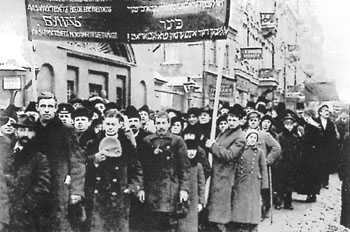Communist Bund (Russia)
| Part of a series on the |
| Jewish Labour Bund |
|---|
 |
| 1890s to World War I |
| Interwar years and World War II |
| After 1945 |
|
| People |
| Press |
|
| Associated organisations |
| Splinter groups |
|
| Categories |
|
The Communist Bund was a Jewish political party in Soviet Russia. It was formed as the Russian Bund was split at its 12th conference in Gomel in April 1920. The Communist Bund was formed out of the leftwing majority section of the erstwhile Russian Bund (the rightwing minority formed the Social Democratic Bund).[1][2]
The fourteen point of the resolution "On the Present Situation and the Tasks of Our Party" at the Gomel conference stated that
Summing up the experience of the last year, the Twelfth Conference of the Bund finds:
- that the Bund, in principle, had adopted the communist platform since the Eleventh Conference,
- that the Programme of the Communist Party, which is also the programme of the Soviet government, corresponds with the fundamental platform of the Bund,
- that a ’united socialist front’ with principled opponents of Soviet power, who draw a line between the proletariat and its government, is impossible,
- that the moment has come when the Bund can relinquish its official oppositional stand and take upon itself responsibility for the Soviet government’s policy.[3]
The resolution on organisational questions at the Gomel conference stated that
The logical consequence of the political stand adopted by the Bund is the latter’s entry into the R.C.P on the same basis as the Bund’s membership of the R.S.D.L.P.. The conference authorised the C.C. of the Bund to see to it, as an essential condition, that the Bund preserve within the R.C.P. the status of an autonomous organisation of the Jewish proletariat.[3]
On May 6, 1920, the Politburo of the Central Committee of the Russian Communist Party (Bolchevik) discussed the question of "The Conditions for the Bund’s Admission to Membership of the R.C.P." and resolved "that Kamenay, Stalin and Preobrazhensky be authorised to receive the representatives of the Bund and hear their proposals".[3]
On June 9, 1920, the communist faction of the Fareynikhte party merged into the Communist Bund. It was also decided that the party would merge into the Russian Communist Party (bolshevik).[4]
At its 13th Conference in 1921 the Communist Bund decided to dissolve itself, and part of its membership joined the Russian Communist Party (bolsheviks) on the basis of the rules of admission.[3]
References
- ↑ Brenner, Michael, and Derek Jonathan Penslar. In Search of Jewish Community: Jewish Identities in Germany and Austria, 1918-1933. Bloomington: Indiana University Press, 1998. p. 127
- ↑ Guide to the YIVO Archives, Volym 0. p. 43
- ↑ 3.0 3.1 3.2 3.3 explanatory note to Lenin, Vladimir I. (between April 19 and May 6, 1920). "To Members of the Politbureau of the C.C., R.C.P.(B.)". Marxists Internet Archive. Lenin Internet Archive (2003). Retrieved 2009-11-10. Check date values in:
|date=(help), from documents archived at the Central Party Archives, Institute of Marxism-Leninism of the C.C., C.P.S.TJ. - ↑ Pinkus, Benjamin. Jews of the Soviet Union: A History of a National Minority. [S.l.]: Cambridge, 1990. p. 129